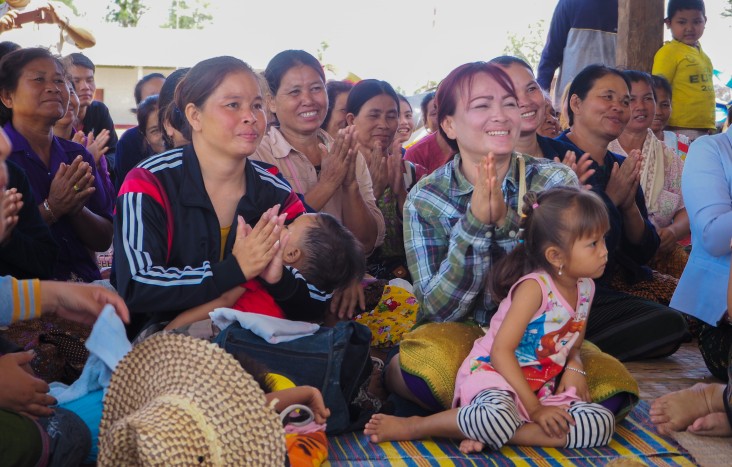Speeches Shim

August 2017—The deep green forests of Songkhone district in Laos’s Savannakhet province are attractive to look at, and draw a lot of attention from villagers who forage and hunt between the trees. Long days looking for wild pigs, birds, grasshoppers and bamboo to feed the family stretch into the night, and people often sleep in the forest.
Unprotected from the elements, their warm bodies attract hungry mosquitoes. Many are laden with malaria. And many bite.
Noy*, a 30-year-old rice and cassava farmer, was among those bitten. Although farming is his main job, he often goes into the forest to look for food. Last year, after coming back from a three-day trek through the woods, he started to get a fever.
His mother, Vang*, a 50-year-old widow and mother of five children, explained that she took him to the district health clinic. The nurse began to perform a rapid diagnostic test like those provided by the U.S. Government and confirmed that he had malaria. The nurse gave him antimalarial drugs and he recovered after three days.
“At that time, I was very scared. I thought I would lose my child, who I raised with my own two hands,” Vang recalled. “Two years ago, we would go to bed without any mosquito net to protect us and we often got sick. We were scared every night and could not have a complete sleep.”
She found herself waking up in the middle of the night to make sure that her grandchildren were safe. On many days, they were afraid to enter their house because of all the mosquitoes flying around.
“Today, we are very pleased with the net we received,” she said, noting it was the second net she received from the U.S. Government. “We feel more confident and relieved sleeping in our own beds. From now on, we can sleep without worries. Now we have the nets in the house, we feel comfortable in our own home.”
“Our lives have changed so much,” added Vang, smiling broadly. “No more sickness, no more fear. We feel relieved and rarely see mosquito in our house. We were told that these nets were treated with chemicals. When the mosquito climbs on them, they die.”
USAID, through support from the U.S. President’s Malaria Initiative (PMI), promotes the use of long-lasting insecticide-treated bednets. Since 2011, USAID has funded and distributed 445,000 nets, 380,000 diagnostic tests, and 58,000 antimalarial treatments. USAID and PMI, along with other donors, supported the Center for Malariology, Parasitology, and Entomology to provide the mosquito nets and other life-saving commodities to those communities most affected.
These investments are taking a bite out of malaria in Laos, officially known as the Lao People’s Democratic Republic (Lao PDR). Since 2014, the number of malaria cases in the country dropped by 70 percent, from a peak of 50,000 cases during a malaria outbreak to 15,000 in 2016.
“It goes to show that bednets deserve all the buzz they can get,” said USAID Laos Country Office Director Alexandria Huerta.
*Full name not available.
LINKS
Follow @USAIDAsia, on Facebook, on Flickr, on YouTube

Comment
Make a general inquiry or suggest an improvement.